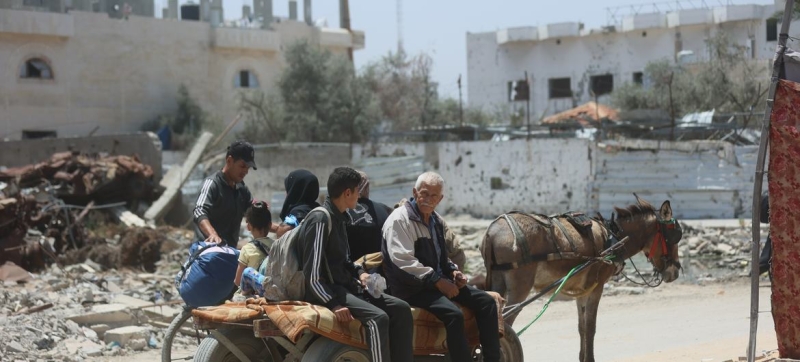- Puppet show enchants Children as Boi Mela comes alive on day 2 |
- DSCC Admin Salam’s drive to make South Dhaka a ‘clean city’ |
- 274 Taliban Dead, 55 Pakistan Troops Killed |
- Now 'open war' with Afghanistan after latest strikes |
- Dhaka's air quality fourth worst in world on Friday morning |
UN Urges Gaza Aid Surge as Israel’s Plan Raises Concerns

Mass displacement continues in Gaza amid ongoing Israeli bombardment.
As a controversial aid distribution initiative backed by the United States and Israel begins in Gaza, the United Nations on Tuesday called for an “immediate surge” of its own pre-positioned humanitarian supplies to avert a worsening starvation crisis.
Following nearly three months of total blockade by Israel, only a “vastly insufficient” volume of aid has entered the devastated enclave in the past week, according to Jens Laerke, spokesperson for the UN Office for the Coordination of Humanitarian Affairs (OCHA).
“We have not stopped operating,” Laerke said, referring to UN staff inside Gaza who continue coordinating with Israeli authorities to retrieve approved aid via the Kerem Shalom crossing. However, he clarified that the UN is not participating in the Israeli aid initiative known as the Gaza Humanitarian Fund, calling it a “distraction” from urgent needs.
“What is actually needed is the reopening of all crossings into Gaza, a secure operating environment, and faster permissions for the emergency supplies we have staged just outside the border,” Laerke stressed.
He highlighted the ongoing dangers and logistical barriers faced by humanitarian workers. “We are not always able to collect aid due to the unsafe routes assigned by Israeli authorities,” he said, adding that all types of aid must be allowed through, not only those pre-selected by Israel.
“The bottom line is this: the aid currently entering Gaza is vastly insufficient. We need the opening of more crossings, and we need unrestricted access,” he insisted.
According to the UN World Food Programme (WFP), 294 trucks have reached the Kerem Shalom crossing from Port Ashdod as of Monday. However, media reports indicated that protesters attempted to block aid lorries from leaving the Israeli port on Tuesday.
“While desperately needed aid is finally trickling into Gaza, the pace is far too slow to meet the overwhelming needs,” WFP warned. The agency noted it has more than 130,000 metric tonnes of food in the pipeline and a functioning delivery network, but without safe and timely access, aid risks becoming ineffective.
Meanwhile, the UN agency for Palestinian refugees (UNRWA) reported that none of its pre-prepared aid shipments have entered Gaza since the Israeli siege began on 2 March. Over 3,000 trucks carrying food and medicine remain stalled in Jordan and Egypt, risking spoilage.
UNRWA spokesperson Juliette Touma stressed that their medical clinics are rapidly running out of basic supplies, including chronic disease medication and simple remedies like paracetamol.
The crisis unfolds as UNRWA faces unproven accusations from Israel of systemic infiltration by Hamas. Commissioner-General Philippe Lazzarini has urged the Israeli government to provide evidence for its claims. An internal UN investigation in 2023 found sufficient grounds to dismiss nine employees over alleged involvement in the 7 October attacks, but no broader systemic breach was found.
An independent probe ordered by the UN Secretary-General concluded that UNRWA’s protocols are among the most stringent in the organisation, reflecting the sensitive nature of their operations in the Occupied Palestinian Territory.
“These unsubstantiated claims have persisted for over 20 months,” said Touma. “They’ve harmed the agency’s reputation and put the lives of our staff—especially those on the ground in Gaza—at serious risk.”
As starvation looms and conflict intensifies, UN agencies reiterated that only a major and sustained surge in humanitarian access—free from political interference—can prevent catastrophe in Gaza.

